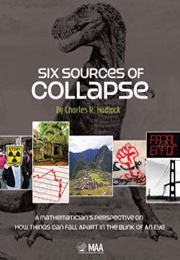 Six Sources of Collapse
Six Sources of Collapse Book contents
- Frontmatter
- Preface
- Acknowledgements
- Contents
- 1 Introduction
- 2 Predicting Unpredictable Events
- 3 Group Behavior: Crowds, Herds, and Video Games
- 4 Evolution and Collapse: Game Playing in a Changing World
- 5 Instability, Oscillation, and Feedback
- 6 Nonlinearity: Invitation to Chaos and Catastrophe
- 7 It's All About Networks
- 8 Putting It All Together: Looking at Collapse Phenomena in “6-D”
- References
- Index
- About the Author
7 - It's All About Networks
- Frontmatter
- Preface
- Acknowledgements
- Contents
- 1 Introduction
- 2 Predicting Unpredictable Events
- 3 Group Behavior: Crowds, Herds, and Video Games
- 4 Evolution and Collapse: Game Playing in a Changing World
- 5 Instability, Oscillation, and Feedback
- 6 Nonlinearity: Invitation to Chaos and Catastrophe
- 7 It's All About Networks
- 8 Putting It All Together: Looking at Collapse Phenomena in “6-D”
- References
- Index
- About the Author
Summary
How's your networking?
Working as a college professor, I spend lots of time talking with students about their future — what they might like to do and how to find the right path to get into it. Hardly anyone emerges from one of these conversations without the word “network” reverberating in their minds. Who do you know that works in this field and who might tell you what it's like? Who do you know who might know someone else in the field who could help identify an internship? What connection might I have through alums or business acquaintances? Who else on campus might I refer them to for leads or advice? Once we start looking at our collective networks, all kinds of connections turn up that could have been so easily overlooked. Of course it doesn't all have to be personal, although that can be especially valuable. We can start following pathways on an electronic network like the World Wide Web and by following a few links also identify useful resources and opportunities. This is networking, and it's almost essential to success in business, government, academia, and practically anything else. In fact, our very survival, let alone success, depends every day on networks: food distribution, electric power, communications, fuel, roads, even blood flow and nerve transmissions in our bodies. We're so tied up with so many networks that it can sometimes seem like a miracle that things run as smoothly as they do.
- Type
- Chapter
- Information
- Six Sources of CollapseA Mathematician's Perspective on How Things Can Fall Apart in the Blink of an Eye, pp. 145 - 172Publisher: Mathematical Association of AmericaPrint publication year: 2012


